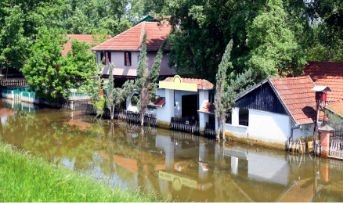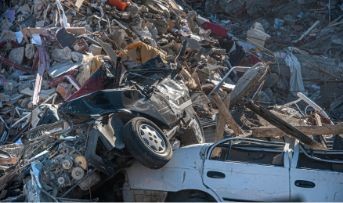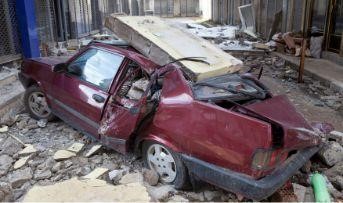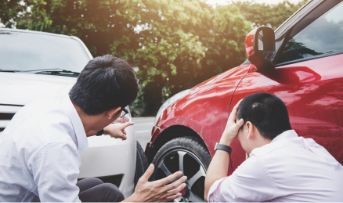General Insurance Blogs, Articles & Updates by - Magma HDI
Have us call you
- RENEW YOUR POLICY
- BUY NEW POLICY

Here are some ways to ensure the protection of your dear ones and assets from flood
Floods are natural disasters that can happen unexpectedly, causing damage to property and putting lives in danger. Even while you can't always stop a flood from occurring, there are precautions you can take to safeguard yourself and your property from damage.
Personal accident insurance India does offer protection in an accident that leaves someone injured or dead. But buying a separate flood insurance policy to protect yourself and your property from flood damage will be ideal. Typically, this policy will cover flooding-related harm to your house, assets, and other property.
Let's look at a few guidelines to protect your loved ones and assets against flooding:
1. Know your risk
The first step in preventing floods from harming you and your belongings is to become aware of your area's flood risk. The likelihood of flooding varies from place to place depending on geography, elevation, and proximity to water sources. Consult the Flood Map Service Centre to determine your flood risk. You can contact your local government or emergency management office to learn about flood dangers.
2. Buy flood insurance
Getting flood insurance is one of the most crucial things you can take to safeguard your home against flood damage. You'll need a particular flood insurance policy to protect your property since standard homeowner's insurance sometimes doesn't cover flood damage. The National Flood Insurance Programme (NFIP) and private insurers offer flood insurance. It's important to carefully read your policy to understand what it covers and how much insurance you have.
3. Elevate your property
Consider elevating your home if you live in a flood-prone location to reduce the chance of heavy damage. Raising your house or property above flood level is called promoting it. It can be accomplished in many ways, including constructing a raised foundation or adding stilts or piers. You can reduce the cost of your flood insurance by elevating your home.
4. Safeguard important documents
Important papers, including insurance policies, forms of identification, etc., should be kept in a secure location in case of a flood. Store these documents in a position that won't likely be affected by flooding. Store them in a waterproof container, like a safe or waterproof bag. You can also make digital copies of your key documents and store them safely online or on a portable hard drive.
5. Install flood-barriers
By keeping water from entering your home, flood barriers can help safeguard your property against flood damage. Sandbags are typical flood barriers to build a wall against flood waters around your home. Another form of flood barrier that is quick and simple to install is a water-filled barrier. Levees or other permanent flood barriers can also be implemented, offering long-term protection against flood damage.
6. Stay informed
You can prepare for a flood and reduce the risk of damage by staying updated about flood alerts and advisories. You can sign up for alerts from emergency management agencies and follow local weather reports online. Follow local officials' advice and vacate the place if a flood warning is issued for your area.
7. Have an emergency plan
You and your family can stay safe in the case of a flood if you have an emergency plan in place. Your emergency plan should contain escape routes, emergency contacts, and a list of things you must take while leaving. To ensure everyone is prepared, practise your emergency plan with your family.
Protecting you and your property against flooding is essential to reduce damage and safeguard your well-being. By looking at flood maps and learning about the local flood history, you can estimate the risk of flooding. Additionally, an emergency plan should be created that details evacuation routes, contact options, and emergency supplies. In addition to personal accident insurance India, buy a separate flood insurance policy to protect assets from the flood.
Click HERE to buy a reliable personal accident insurance India policy.
Disclaimer: The information provided above is for illustrative purposes only. To get more details, please refer to policy wordings and prospectus before purchasing a policy.

Complete guide to ensure the safety of your car during an earthquake
As natural catastrophes become more frequent and severe, safeguards are critical to keeping our vehicles safe. As car owners, we put a lot of time and money into buying and maintaining our automobiles. Therefore, we must protect them against disasters like earthquakes. Not only earthquake damages are expensive to fix, but they can also jeopardise your and your family's safety. In this article, we will go through a complete guide to ensure the safety of your car during an earthquake. We will review detailed points to protect your vehicle and yourself from potential earthquake damage.
In addition, we will discuss the significance of online car insurance and how it can assist in protecting you financially in the event of earthquake damage. Following these tips may make your car as safe as possible during an earthquake and be better prepared for future natural disasters. Let's get started.
1. Select a secure parking spot
Choosing a safe parking area is critical to ensuring your car's safety during an earthquake. Avoid parking in places prone to landslides or with many trees that could fall on your vehicle. Look for parking spaces in open areas away from buildings and trees, such as parking lots. Additionally, attempt to position your car facing outwards so you may quickly evacuate in an emergency.
2. Safeguard your vehicle
When an earthquake strikes, your car may shake severely, and anything inside may become lethal projectiles. As a result, it's always advisable to keep your car's contents intact and unloose. Protect any unsecured goods inside your vehicle, such as computers, luggage, and other items. Additionally, ensure that your car is in good shape and that all parts, including wheels and tyres, are securely fastened.
3. Keep valuable documents safe
Maintaining your car insurance documents, registration papers, and other important documents is required in a secure location. Always keep them in a waterproof and fireproof container in your car or a safe place at home. Keep a digital copy of your documents on your phone or other digital devices.
4. Check your online car insurance protection
Earthquakes can cause severe damage to your vehicle, so ensure your car insurance is updated. Verify your online car insurance policy covers earthquake damage. Also, be sure you understand what your insurance policy covers and what it does not.
5. Prepare an emergency kit
During an earthquake, having an emergency pack in your car is critical. A first-aid kit, a torch, a blanket, a map, and a portable charger should all be included in the kit. You can also have some non-perishable food and drink.
6. Stay in your car
During an earthquake, remain inside your vehicle and fasten your seatbelt until the shaking stops. If you're driving, pull over to a safe location, turn off the engine, and remain inside your vehicle until the shaking stops.
7. Be cautious after the earthquake
Drive with caution after the earthquake. Examine your vehicle for any apparent damage, such as dents, scrapes, or shattered windows. If you fear that your car has suffered substantial damage, wait to drive it until a specialist has inspected it.
8. Prepare for future earthquakes
Earthquakes can occur anytime, and preparing for future quakes is critical. Keep your car in good shape and regularly serviced to guarantee its functioning. Consider adding safety measures, such as a GPS tracker, an alarm system, or a dashcam, to protect your vehicle in the event of damage.
In conclusion, securing the safety of your vehicle during an earthquake is critical. The above safety tips can help safeguard your car from harm during an earthquake. Protect yourself and your family by adequately preparing and caring for your vehicle during an earthquake. You can explore all the insurance options available from the convenience of your home and purchase online car insurance that caters to your needs in the best ways possible. Remember that safety comes first, and taking precautions now might save you a lot of trouble later.
Click HERE to learn more about purchasing online car insurance and its benefits.
Disclaimer: The information provided above is for illustrative purposes only. To get more details, please refer to policy wordings and prospectus before purchasing a policy.

The future of car insurance coverage for earthquakes in India: Trends and innovations
The frequency and intensity of earthquakes have grown in recent years, inflicting property damage, including car damage. Car owners are required by law to carry car insurance, and as a result, insurance policies are expanding to cover earthquake damage. The future of automobile insurance coverage for earthquakes in India is a critical issue that impacts both car owners and insurance providers.
In this space, we will look at the various types of coverage available, the role of technology, and how car owners may guarantee their vehicles the best coverage in the case of an earthquake. Let's begin!
1. Increase in natural disasters
Natural disasters such as earthquakes have become more common in India. Since India has been witnessing more earthquakes with magnitudes greater than 3.0 recently, car owners must have insurance coverage to safeguard their valuable assets against the adversities of an earthquake.
2. Comprehensive car insurance
Comprehensive car insurance protects your car against natural disasters such as earthquakes. It differs from a third-party liability policy, which solely covers damages to a third party in the event of an accident. Car owners should think about getting comprehensive car insurance that covers earthquake damage.
3. Earthquake coverage add-ons
Aside from comprehensive insurance, vehicle insurance companies often provide add-ons to cover specific natural disasters such as earthquakes. The optional features include engine protection, roadside assistance, and 0% depreciation. Car owners should consider obtaining these add-ons to supplement their coverage.
4. Usage-based car insurance
In India, usage-based automobile insurance coverage is becoming more common. These policies base premiums on vehicle usage, and the car owners who drive their vehicles less frequently pay a lower rate. In the future, usage-based automobile insurance policies can be tailored to provide earthquake coverage based on the vehicle's geographical location.
5. Telematics
Telematics uses technology to monitor a vehicle's performance and usage. In the future, automobile insurance companies may utilise telematics to track the car's location and provide coverage for earthquake damage based on the vehicle's location.
6. Artificial Intelligence (AI)
Artificial intelligence can be used to analyse data and generate customised insurance plans. In the coming years, AI might analyse earthquake-prone locations and offer customised vehicle insurance coverage to protect against earthquake damage.
7. Self-driving cars
As self-driving cars become more prevalent in India, it is crucial to remember that just like regular cars, they are exposed to theft, loss, or damage through natural calamities such as earthquakes, storms, or human-made issues like riots. As a result, the growing demand for customised insurance coverage that covers unique circumstances for self-driving automobiles. The insurance coverage premiums, as mentioned earlier, would be based on the criteria such as the car’s location, distance from the epicentre, and the time of the earthquake.
8. Internet of Things (IoT)
The Internet of Things (IoT) uses linked devices to collect and analyse data. IoT can be used to monitor cars and identify earthquakes in real-time. The information can be used to create tailored insurance policies that cover earthquake damage. Car insurance firms, for example, can use IoT to detect when a car is parked in an earthquake-prone location and provide coverage for probable damage.
Car insurance policies are evolving to cover natural calamities such as earthquakes. Car owners can buy car insurance policy online that cover specific natural disasters such as earthquakes. Car insurance coverage will be personalised based on telematics, artificial intelligence, and self-driving cars. Owners should explore all the options and buy a car insurance policy online from trustworthy firms to get the best insurance coverage and a policy that caters to all their needs.
Click HERE to learn more about how you can buy car insurance policy online.
Disclaimer: The information provided above is for illustrative purposes only. To get more details, please refer to policy wordings and prospectus before purchasing a policy.

Here's all you need to know about parked car damage and the ways to deal with it
Imagine you park your car in the open and are left surprised when you find it crashed. Parking damage refers to the damage caused to your parked car by an unknown person. You should know what to do if someone hits your parked car.
This article tells you what to do when someone damages your parked car. Additionally, it is advisable to buy car insurance online to protect your vehicle from unexpected damage.
Who pays for parking damages?
If a known person with a liability car insurance policy hits your parked car, their insurance company will pay for your damage. But if a stranger or unknown person hits your car, your car insurance company will pay for the parked car damage.
What should you do when someone hits your parked car?
The first thing you should do is to remain calm and alert when you encounter a parked car damage and follow these tips, including:
1. Find the witness to the accident
If you don't see a driver damaging your car, you should look for witnesses to the accident. Try to find the people who were at the accident spot, and once you find them, ask them about the description or details of the vehicle that damaged your car.
2. Note the offender's details
If you see a vehicle that damages your car, write down its details on paper, such as its registration number, colour, model, etc., and store it safely. You'll have to produce all these details at the police station at the time of filing the FIR and insurance claim.
3. Look for a security camera
Generally, parking spaces and market areas have security cameras installed. You can check who slammed your car and use a copy of the footage to claim your car's damage coverage. However, if the parking space has no cameras, look for nearby residences and shops with security cameras.
4. Capture image proof of the accident spot and your damaged car
Take a picture or video of the accident spots and your damaged car, and procure it as evidence of the accident. Insurance companies will approve your claim based on image proofs.
5. Call the police and file an FIR
Report to the police about your parking car damage, as they can help you find the offender. Moreover, if someone gets injured in a parking car accident, calling the police and filing an FIR becomes mandatory.
6. Inform your car insurer about the accident
Once you follow all the above steps, you should notify your car insurance company about the accident. The company will help you cover your car damage by raising a claim.
What to avoid when someone hits your parked car?
Most people make common mistakes when encountering parking damage. Here are the mistakes you should avoid, including:
1. Chasing the offender
Avoid chasing the driver that hit your car before checking for car damages like leaks, brake failure, etc., or any injuries caused to the person inside the car. Check for injuries and seek medical attention if required.
2. Creating chaos
Most people lose their composure and cause chaos by blaming others around the accident spot. Instead, stay calm and capture pictures or videos of accident spots.
3. Sending car for repair
You should avoid sending the car for repair before filing an FIR and informing the insurance company.
Parked car damage is an upsetting accident, but you have to be patient before you take any steps to deal with it. It is better to wait for the person who hit your car to return and complete the accident report together. If not, follow the above tips to get compensation for the damages to your car from your insurer. Whether you have an expensive or leased car, you should get car insurance online to insure it against parking damage, injury to the driver, and theft.
Click HERE to buy car insurance online.
Disclaimer: The information provided above is for illustrative purposes only. To get more details, please refer to policy wordings and prospectus before purchasing a policy.


